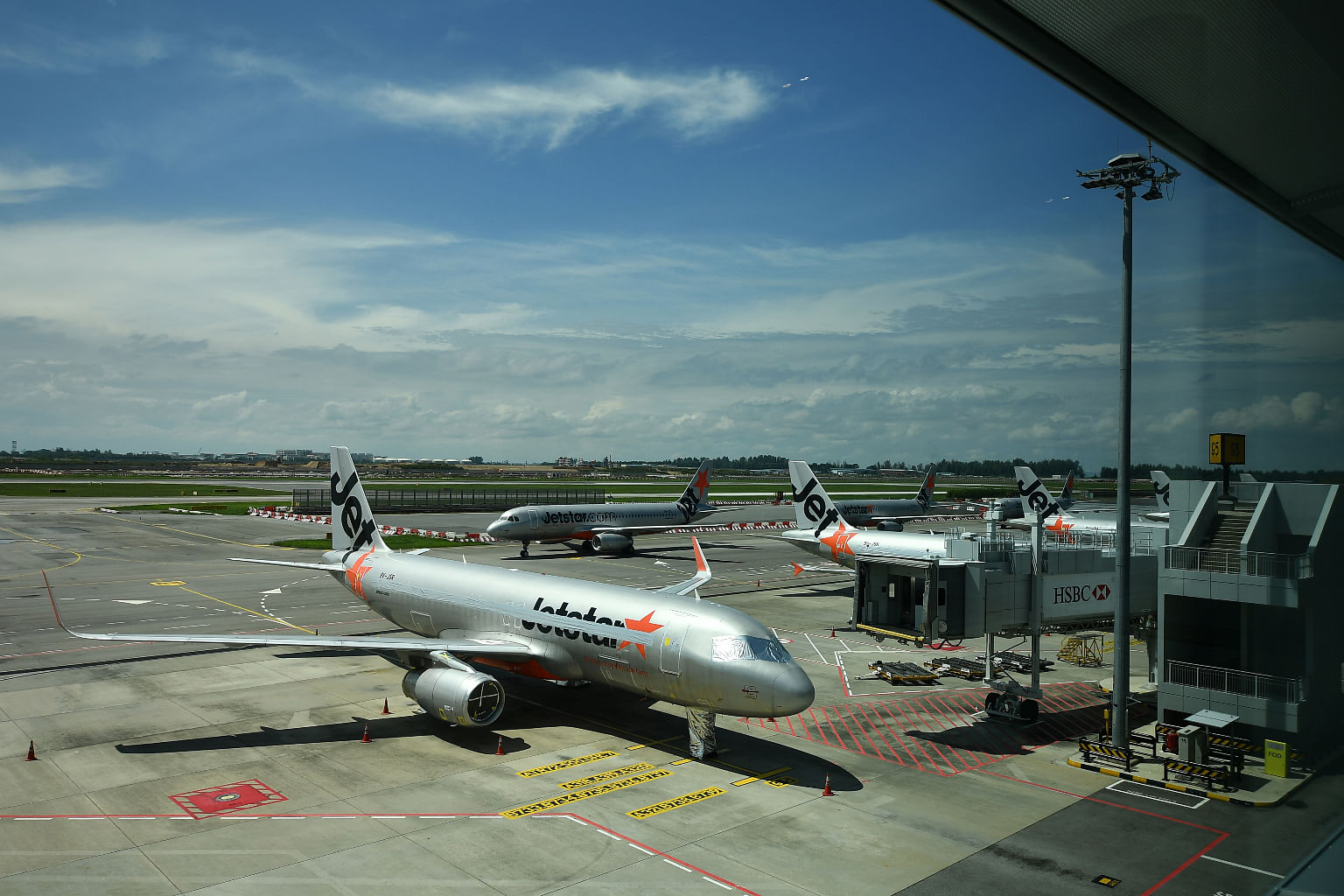'No intention of moving': Jetstar fires back at Changi Airport's decision to relocate it to T4
Sign up now: Get ST's newsletters delivered to your inbox

Jetstar Group has been operating out of T1 even before the pandemic, and most of its operations are located there.
PHOTO: ST FILE
Follow topic:
SINGAPORE - Australian low-cost carrier Jetstar on Friday (July 22) rejected Changi Airport’s decision to relocate its flights to Terminal 4, saying the decision was taken “unilaterally” and done in bad faith before any agreement has been reached.
In response, Changi Airport Group (CAG) said Jetstar’s relocation was the “only option” that would allow the airport to optimally use its aircraft gates, even as it promised that “special provisions” would be made to cater to the needs of Jetstar’s passengers as much as possible.
On Friday, CAG announced that 16 airlines, including Jetstar, would be relocating to T4 when it reopens on Sept 13 to cater to rising passenger numbers. Jetstar is slated to move on Oct 25.
This was followed 1½ hours later by a Jetstar statement that expressed the airline’s extreme disappointment, saying its concerns were ignored.
“Until an agreement is reached, we have no intention of moving and have informed CAG of that fact,” the airline said.
“A joint study was only agreed to be undertaken last week and this announcement completely disregards that agreement and the impact a move would have on our customers, our people, and our operations.”
Observers said Jetstar’s unhappiness stems from its high reliance on connections with other foreign airlines. Its current terminal – T1 – offers better connectivity to the other terminals than T4, which is located further away.
Jetstar, a wholly owned subsidiary of Australian airline Qantas, connects to many cities in South-east Asia, as well as international flights operated by airlines such as Emirates, Japan Airlines and Qatar Airways and Qantas.
CAG noted that its engagement with Jetstar about the move to T4 was not recent, and had begun in 2019 before the Covid-19 pandemic when Changi was experiencing tight capacity during peak hours.
CAG said it has studied various scenarios of airline terminal allocation across its four terminals and that the best solution was to move Jetstar to T4, to support both Jetstar’s and other airlines’ growth at Changi.
It said it is experiencing tight capacity during peak hours – like other airports in Asia – and urgent moves must be made to meet expected traffic demands by end-October, a traditionally busy season due to the northern winter.
“With 17 gates to support narrow body aircraft, T4 is a very good fit for Jetstar, which currently operates predominately narrow-bodied aircraft,” CAG said. “With a high degree of automation at T4, there would also be opportunities for Jetstar to reap productivity gains and long-term cost savings. The benefits from relocating to T4 have also been shared with Jetstar.”
CAG said it has studied various scenarios of airline terminal allocation across its four terminals and that the best solution was to move Jetstar to T4, to support both Jetstar’s and other airlines’ growth at Changi.
It said it is experiencing tight capacity during peak hours – like other airports in Asia – and urgent moves must be made to meet expected traffic demands by end-October, a traditionally busy season due to the northern winter.
“With 17 gates to support narrow body aircraft, T4 is a very good fit for Jetstar, which currently operates predominately narrow-bodied aircraft,” CAG said. “With a high degree of automation at T4, there would also be opportunities for Jetstar to reap productivity gains and long-term cost savings. The benefits from relocating to T4 have also been shared with Jetstar.”
CAG added that it has accepted Jetstar’s suggestion to form a joint task force to ensure a smooth transition for the airline.
Mr Mayur Patel, head of Asia at OAG Aviation, noted that the gates at T1 are getting increasingly congested as the number of flights increase post-pandemic. He said he was surprised that CAG made the announcement to move Jetstar before the consultation was completed.
Because T4 is located a distance away from the other three terminals, it is also usually used for flights that have no transfers – typically regional flights or point-to-point flights like those between Singapore and Hong Kong or South Korea, he said.
Mr Brendan Sobie of Sobie Aviation said the move would be significant from a local consumer perspective because Jetstar includes Jetstar Asia, which is the only local airline that is not part of the Singapore Airlines (SIA) Group, accounting for 6 per cent of Changi Airport's traffic before the pandemic.
Its business model relies heavily on connections with other airlines, and a move to T4 would make it harder for Jetstar Asia to recover to its pre-Covid-19 level, he noted. In 2019, Jetstar Asia flew 4.5 million passengers and operated 18 aircraft. It now operates seven.
“Jetstar Asia feeds not only Qantas but also many other foreign airlines, most of which are not partnered with SIA, so therefore rely on Jetstar Asia,” he said.

